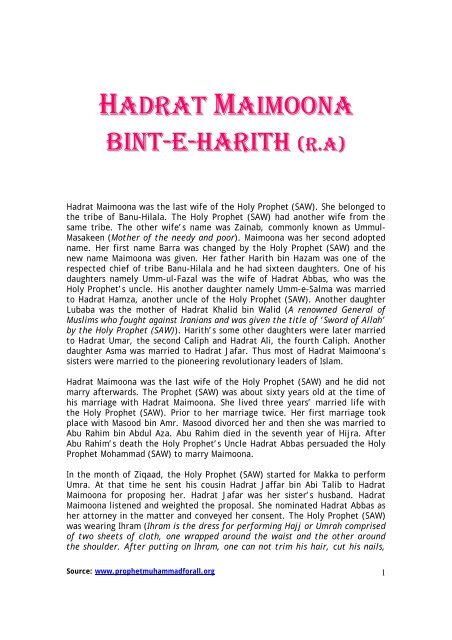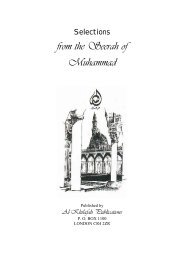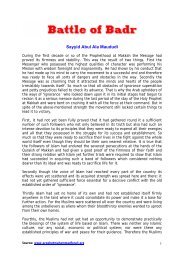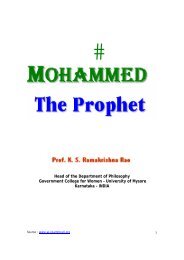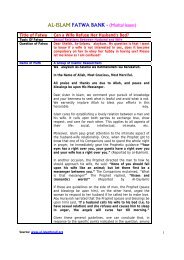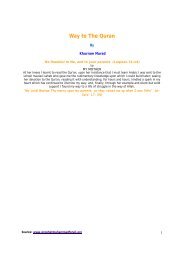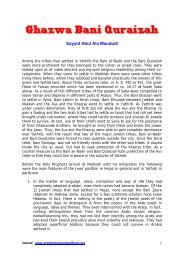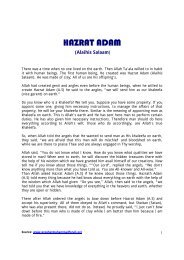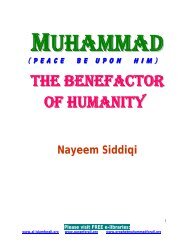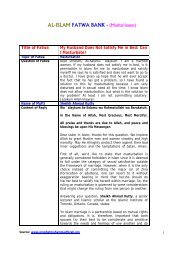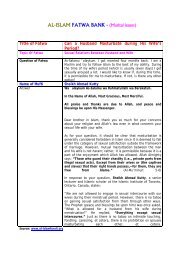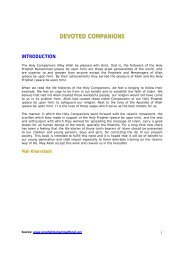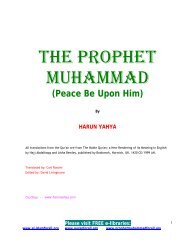hadrat maimoona bint-e-harith - Prophet Muhammad (SAW) for All
hadrat maimoona bint-e-harith - Prophet Muhammad (SAW) for All
hadrat maimoona bint-e-harith - Prophet Muhammad (SAW) for All
Create successful ePaper yourself
Turn your PDF publications into a flip-book with our unique Google optimized e-Paper software.
HADRAT MAIMOONA<br />
BINT-E-HARITH (R.A)<br />
Hadrat Maimoona was the last wife of the Holy <strong>Prophet</strong> (<strong>SAW</strong>). She belonged to<br />
the tribe of Banu-Hilala. The Holy <strong>Prophet</strong> (<strong>SAW</strong>) had another wife from the<br />
same tribe. The other wife’s name was Zainab, commonly known as Ummul-<br />
Masakeen (Mother of the needy and poor). Maimoona was her second adopted<br />
name. Her first name Barra was changed by the Holy <strong>Prophet</strong> (<strong>SAW</strong>) and the<br />
new name Maimoona was given. Her father Harith bin Hazam was one of the<br />
respected chief of tribe Banu-Hilala and he had sixteen daughters. One of his<br />
daughters namely Umm-ul-Fazal was the wife of Hadrat Abbas, who was the<br />
Holy <strong>Prophet</strong>’s uncle. His another daughter namely Umm-e-Salma was married<br />
to Hadrat Hamza, another uncle of the Holy <strong>Prophet</strong> (<strong>SAW</strong>). Another daughter<br />
Lubaba was the mother of Hadrat Khalid bin Walid (A renowned General of<br />
Muslims who fought against Iranians and was given the title of ‘Sword of <strong>All</strong>ah’<br />
by the Holy <strong>Prophet</strong> (<strong>SAW</strong>)). Harith’s some other daughters were later married<br />
to Hadrat Umar, the second Caliph and Hadrat Ali, the fourth Caliph. Another<br />
daughter Asma was married to Hadrat Jafar. Thus most of Hadrat Maimoona’s<br />
sisters were married to the pioneering revolutionary leaders of Islam.<br />
Hadrat Maimoona was the last wife of the Holy <strong>Prophet</strong> (<strong>SAW</strong>) and he did not<br />
marry afterwards. The <strong>Prophet</strong> (<strong>SAW</strong>) was about sixty years old at the time of<br />
his marriage with Hadrat Maimoona. She lived three years’ married life with<br />
the Holy <strong>Prophet</strong> (<strong>SAW</strong>). Prior to her marriage twice. Her first marriage took<br />
place with Masood bin Amr. Masood divorced her and then she was married to<br />
Abu Rahim bin Abdul Aza. Abu Rahim died in the seventh year of Hijra. After<br />
Abu Rahim’s death the Holy <strong>Prophet</strong>’s Uncle Hadrat Abbas persuaded the Holy<br />
<strong>Prophet</strong> Mohammad (<strong>SAW</strong>) to marry Maimoona.<br />
In the month of Ziqaad, the Holy <strong>Prophet</strong> (<strong>SAW</strong>) started <strong>for</strong> Makka to per<strong>for</strong>m<br />
Umra. At that time he sent his cousin Hadrat Jaffar bin Abi Talib to Hadrat<br />
Maimoona <strong>for</strong> proposing her. Hadrat Jafar was her sister’s husband. Hadrat<br />
Maimoona listened and weighted the proposal. She nominated Hadrat Abbas as<br />
her attorney in the matter and conveyed her consent. The Holy <strong>Prophet</strong> (<strong>SAW</strong>)<br />
was wearing Ihram (Ihram is the dress <strong>for</strong> per<strong>for</strong>ming Hajj or Umrah comprised<br />
of two sheets of cloth, one wrapped around the waist and the other around<br />
the shoulder. After putting on Ihram, one can not trim his hair, cut his nails,<br />
Source: www.prophetmuhammad<strong>for</strong>all.org 1
abuse or have sex etc.). In the same condition he sent five hundred Dirhams as<br />
Mehr to Hadrat Maimoona and the Nikah ceremony was Per<strong>for</strong>med While on<br />
return after Umra from Makkah to Madina, he stayed at a place called Saraf.<br />
This place is ten miles away from Makkah on way to Madina. At Saraf, the feast<br />
of Walima (The feast, i.e. lunch or dinner offered to friends and guests on the<br />
next day of the marriage) was held.<br />
A great even followed the marriage of Hadrat Maimoona’s to the Holy <strong>Prophet</strong><br />
(<strong>SAW</strong>). Hadrat Maimoona’s nephew Hadrat Khalid bin Walid embraced Islam. He<br />
was a very talented and brave man from the Quraish tribe. He was also a great<br />
warrior and renowned soldier. After her marriage when Hadrat Maimoona went<br />
to Medina with the Holy <strong>Prophet</strong> (<strong>SAW</strong>), Hadrat Khalid bin Walid addressed his<br />
tribe and declared, “I can no longer remain in your fold”. Thus a great <strong>for</strong>ce in<br />
the shape of Hadrat Khalid came to Islam’s side. After marriage Hadrat<br />
Maimoona kept herself grooming to the tenets of Islam and fully grasped<br />
religious knowledge. She acquired a clear and straight-<strong>for</strong>ward vision of Islam.<br />
As said earlier in other sketches of the wives of the Holy <strong>Prophet</strong> (<strong>SAW</strong>) women<br />
easily fall prey to superstition. A great weakness in the Arab women in those<br />
days was to vow or pledge <strong>for</strong> certain fulfillment of their ambitions on the<br />
graves and tombs of pious people. Fulfillment of their pledge so made on any<br />
tomb was taken as obligatory. This practice had made the graves of the pious<br />
dead holier than mosques or the Kaaba. This trend was greatly discouraged by<br />
Hadrat Maimoona. She told the women that the practice of going to the graves<br />
to ask <strong>for</strong> the fulfillment of wishes is satanic and tantamount to negation of<br />
Almighty <strong>All</strong>ah, which is the biggest evil; since in Islam, asking <strong>for</strong> something<br />
from other than <strong>All</strong>ah is Shirk (Shirk is the ugliest sin. It means sharing<br />
anybody else in the authority and powers of <strong>All</strong>ah) and it is the worst sin.<br />
There is quite a famous incident attached to this concept of Shirk. Once an<br />
ailing woman vowed that if she recovered from the disease, she will offer<br />
prayers at Aqsa Mosque, at Jerusalem. On regaining her health, she started<br />
making preparation <strong>for</strong> her journey to Aqsa Mosque. Hadrat Maimoona came to<br />
know about it. She called that woman, expressed her anger and said,<br />
“What is there in vows and pledges? Aqsa is not better than Masjid-e-Nabvi. Go<br />
and offer your prayers in Masjid-e-Nabvi”.<br />
This incident shows how much she knew about the progressive spirit of Islam.<br />
She was very particular about the commandments of Islam. Once one of her<br />
relatives came to visit her. The pungent odour of wine was coming out of his<br />
mouth. She rebuked him and broke off all relations with her relative <strong>for</strong> the<br />
rest of her life. She asked him never to visit her again. Due to these qualities,<br />
Hadrat Ayesha remarked about her:<br />
“Maimoona was more God-fearing and kind hearted than all of us (wives)”.<br />
Source: www.prophetmuhammad<strong>for</strong>all.org 2
Annalists have reported that occasionally she borrowed money from others. It<br />
seems that she never liked to be financially tight. Once she took a large<br />
amount from someone who asked that how it would be returned. She replied,<br />
“The Holy <strong>Prophet</strong> had said anybody who intends repaying a debt; <strong>All</strong>ah comes<br />
to his help and pays his debt”.<br />
This shows that borrowing was not a matter of routine <strong>for</strong> her but she was<br />
always careful to repay the debt.<br />
Hadrat Maimoona had a great love <strong>for</strong> teaching and preaching of Islam. She has<br />
narrated <strong>for</strong>ty-six traditions and according to some, seventy-six traditions.<br />
People used to come to her <strong>for</strong> the solution of their various religious problems<br />
and she always guided them with intelligent replies to their questions. In those<br />
days, the period of a woman’s menstruation was considered as a bad omen. A<br />
biological change in human body can’t be a reason <strong>for</strong> a curse or bad luck.<br />
Some illiterate women used to discontinue their daily routine assuming<br />
themselves filthy. One day her nephew, Hadrat Ibn-e-Abbas came to pay his<br />
regards to Hadrat Maimoona. His hairs were not properly combed”. He said:<br />
“My wife is having menses and since she is the one who combs my hair and now<br />
she can’t touch me, so my hair is uncombed”.<br />
“I see. The Holy <strong>Prophet</strong> (<strong>SAW</strong>) used to lie with us during our menses and<br />
recited holy verses. We even handled the mats of the mosque. Son, the hands<br />
are not dirty during the menses, are they”?<br />
This small example indicated that Islam shuns every kind of superstition. Even<br />
now-a-days, the Muslims women do not touch the Holy Quran even wrapped in<br />
cloth, and avoid heaving the Holy verse etc. This sort of wrong thinking should<br />
be discarded.<br />
Hadrat Maimoona lived only three years with the Holy <strong>Prophet</strong> (<strong>SAW</strong>). After the<br />
Holy <strong>Prophet</strong>’s death, she lived <strong>for</strong> <strong>for</strong>ty-one years. Hadrat Maimoona died in<br />
51 st year of Hijra. It is a strange coincidence that she died on the same place<br />
where she got married with the Holy <strong>Prophet</strong> (<strong>SAW</strong>). She died at Saraf and was<br />
buried at the same place. Saraf which, <strong>for</strong>ty-four years ago, had become a<br />
happy place of merriment, later became her burying place. Perhaps this was to<br />
prove the height of her love <strong>for</strong> her husband.<br />
Hadrat Ibn-e-Abbas led her funeral prayers. When her coffin was lifted and was<br />
carried towards the grave, Hadrat Ibn-e-Abbas said:<br />
“Don’t shake her bed. Be respectful and carry her with ease. She is the wife of<br />
the Holy <strong>Prophet</strong> (<strong>SAW</strong>)”.<br />
She was the last wife of the Holy <strong>Prophet</strong> (<strong>SAW</strong>) and was the last to die among<br />
his wives. She was a kind and very pious lady. During her life, she set many a<br />
Source: www.prophetmuhammad<strong>for</strong>all.org 3
slaves free. Once during the life of the Holy <strong>Prophet</strong> (<strong>SAW</strong>), she set a slave free<br />
to enjoy the rights of a free citizen, the Holy <strong>Prophet</strong> (<strong>SAW</strong>) praised her saying,<br />
“Maimoona, <strong>All</strong>ah will reward you <strong>for</strong> this act”.<br />
She was also a great scholar of religion. Even her nephew Ibn-e-Abbas who<br />
later became a great scholar interpreter and commentator of the Holy Quran,<br />
was her pupil.<br />
Source: www.prophetmuhammad<strong>for</strong>all.org 4


